
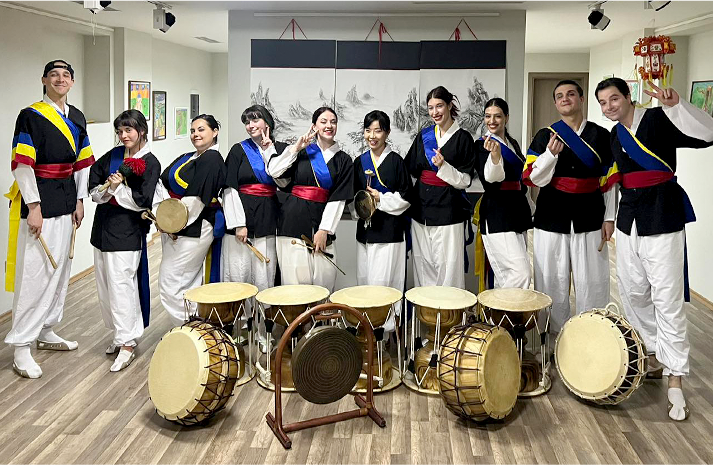
Introducing the Enthusiastic Stories
of the Samulnori Culture Class Learners
at KSI Sofia, Bulgaria!
Since 2017, KSI Sofia has been operating the Sejong Cultural Academy and the Samulnori Culture Class for KSI
Sofia learners and Sofia University students. We spoke to three learners who are deeply passionate about
Samulnori and participate in KSI Sofia's Samulnori Culture Class to hear their stories about how they fell in
love with Samulnori.
Meet the Three Students of the Sejong Cultural Academy’s Samulnori Culture Class at KSI Sofia, Bulgaria
(From left) Gabriela Markova, Ivelina Makedonska, Martina Mishonova
Hello! Gabriela Markova, Ivelina Makedonska, and Martina Mishonova, nice to meet you. Could each of you please
introduce yourselves?
Gabriela Markova (hereafter Gabriela) : Hello. I am Gabriela Markova, a third-year student majoring in
Korean Studies at Sofia University. I have been learning Samulnori at KSI Sofia since 2022.
Ivelina Makedonska (hereafter Ivelina) : Hello. I am Ivelina Makedonska. I work for the cyber security
team of a company in Bulgaria, handling sales management and HR duties. I also started learning Samulnori in
2022 and have been consistently attending classes since then.
Martina Mishonova (hereafter Martina) : Hello. I am Martina Mishonova, a third-year student majoring in
Korean Studies at Sofia University. I have been learning Korean at KSI Sofia for two years, and then I enrolled
in the Korean Studies program. I started learning Samulnori when the Samulnori Culture Class was introduced at
KSI Sofia in 2017, and I have been attending classes for about seven years now.
What first sparked your interest in Samulnori? There are various contemporary Korean cultural contents like
K-Pop, K-Drama, and K-Beauty, but what led you to learn the traditional Korean culture of Samulnori?
Gabriela : In my major, Korean Studies, we learn about Korean language as well as its culture,
traditions, history, etc. I first encountered Samulnori through an elective course on Samulnori at the
university. In the summer of 2022, I participated in a Samulnori workshop and visited the National Center for
Korean Traditional Performing Arts in Jindo County, Jeollanam-do, for two weeks. Although I know K-Pop is
globally popular, traditional Korean instruments and music have always fascinated me more.
Ivelina : I started learning Korean a few years ago, but unfortunately, I didn't have enough time to
attend Korean language classes at KSI. While looking for other programs I could join, I came across the
Samulnori Culture Class and decided to start. I am very interested in K-Beauty as all my daily cosmetics are
Korean products, but Samulnori is particularly a healing and exciting hobby for me, so I put more passion and
interest into it.
Martina : I first started learning Korean at KSI in 2017. At the end of my first semester, there was a
Samulnori performance. I didn't know much about Samulnori back then, but I found the performance so enjoyable
that I wanted to try it myself. So, I registered for the Samulnori Culture Class as soon as it opened the next
semester. Initially, I started because it looked fun, but as I continued, I found it so fascinating and exciting
that I wanted to do it with my friends for the rest of my life. I originally liked K-Pop, which led me to start
learning Korean and later watching dramas, but through Samulnori, I gradually discovered the charm of
traditional Korean culture and fell deeply in love with it. Even now, I prefer traditional Korean culture over
the latest trends.
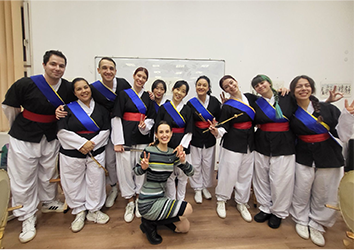
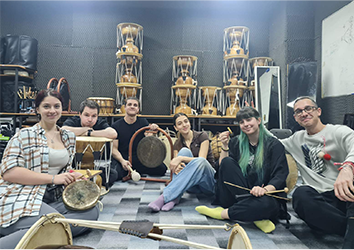
(Left Photo) Commemorative photo with Teacher Kim So-young(front) before a Samulnori performance
(Right Photo) Students of the 2024 KSI Sofia Samulnori Culture Class(Intermediate Level)
What is the charm of Samulnori that you discovered through KSI Sofia? We are curious about what makes you
passionate and enjoy the classes so much.
Gabriela : Honestly, I spend my weekdays just waiting for Saturday, the day of the Samulnori Culture
Class at KSI Sofia. I enjoy spending time practicing and playing instruments with the amazing people I met in
the class. After a tough week, it feels like I can finally relax, and the energy that comes from practicing
together makes me happy. Every time we perform Samulnori, I experience a range of emotions, and the satisfaction
that comes after the performance is indescribable.
Ivelina : Samulnori is captivating music that lets you feel exciting energy. This charm keeps me
passionate about the classes. Through Samulnori, I experience many things, and I can learn about Korean culture
professionally from the teachers at KSI Sofia and the instructors from the Sejong Cultural Academy in Korea.
This is one of the reasons I continue to be passionate about Samulnori.
Martina : The charm of Samulnori is easy for anyone to find because it embodies 'sharing' and
'excitement'. Samulnori is a group performance, and all the instruments depend on each other, so if even one is
missing, the harmony breaks. On the other hand, sharing time and laughter with friends adds to the excitement.
In these moments, all worries, sadness, and anxiety disappear, and Samulnori's magical charm brings peace to the
mind. This charm makes my friends and me register for the Samulnori Culture Class every time. While Samulnori is
currently a hobby that makes me very happy, I would like to study Korean traditional music or Nongak
professionally in Korea in the future. These days, I am truly happy because I can build skills, play, and have
fun with friends who love Samulnori in the Samulnori Culture Class.
Among the four instruments of Samulnori – the buk, kkwaenggwari, jing, and janggu – which instrument do you
primarily play? Do you have a favorite among the four instruments?
Gabriela : So far, I have always played the janggu. This semester, I am practicing the kkwaenggwari. I
love all the instruments in Samulnori, and I hope to learn and master each one over time.
Ivelina : I first learned to play the janggu, followed by the buk. However, my favorite instrument is the
janggu. It requires a lot of focus, and its sound is excellent, strong, and confident, which is why I like it
more.
Martina : I have played all the instruments of Samulnori, but recently I mainly play the janggu and the
kkwaenggwari. The reason I chose these two instruments is that their playing techniques are not easy. In
particular, the kkwaenggwari can produce a variety of sounds with small hand movements, which still fascinates
me. Playing the janggu is also exciting and fun because I can create new and diverse rhythms with my hands.
(Left Photo) Samulnori performance in front of the Sofia City Library last May
(Right Photo) Commemorative photo after the performance
I understand you have performed in many areas within Sofia and Bulgaria. How do Bulgarian audiences react to
your Samulnori performances?
Gabriela : Bulgarians are always amazed when they hear us play traditional Korean instruments and are
very curious about them. Many people come to watch our performances and always ask why we started Samulnori.
They often say they've never heard such music before. I find it particularly amusing that they call the
kkwaenggwari a 'pot' because of its unique sound.
Ivelina : Usually, people who come to our performances don’t know much about Samulnori. Yet, their
reactions are always enthusiastic. I believe people are happy when they see our Samulnori performances. My
family also feels happy watching me perform and supports my hobby. I have only performed in Sofia, but I would
love to perform in other areas of Bulgaria.
Martina : The Bulgarian traditional instrument 'tupan' is very similar to the janggu, so many Bulgarians
enjoy listening to Samulnori music. Initially, their reaction might be 'it’s loud', but gradually, they begin to
enjoy the rhythms and beats of Samulnori, which are similar to Bulgarian traditional music. My family and
friends also love watching my Samulnori performances. Interestingly, people around me say that even if we play
the same piece every time, it feels like a new performance from start to finish. I often hear from friends, "How
can you play different rhythms with both hands? It's really amazing!"
Can you share the most memorable moment you’ve had while learning Samulnori?
Gabriela : It's hard to pick just one memorable moment because every moment of learning Samulnori is
enjoyable. However, if I had to choose, it would be during performances. Being with amazing people who share a
passion for traditional Korean music makes every mistake insignificant. I am always happy and satisfied just to
be able to perform Samulnori together.
Ivelina : Like Gabriela, every moment of playing Samulnori is memorable, so it's difficult to pick just
one. However, I remember a time when I forgot my part during a performance. The team leader's quick thinking
covered my mistake, which left a lasting impression on me.
Martina : Recently, we did a small performance at a friend’s graduation ceremony. The venue was so small
that it was challenging to play, but we managed to perform well, and my friend said it was a moving and
unforgettable day. Another memorable moment was two years ago when we performed in front of the Sofia City
Library on a rainy day. Just as we started our performance, the rain, which had momentarily stopped, started
pouring again. We laughed so much seeing each other soaked while singing the refrain 'Our World is Shining on
Us.'
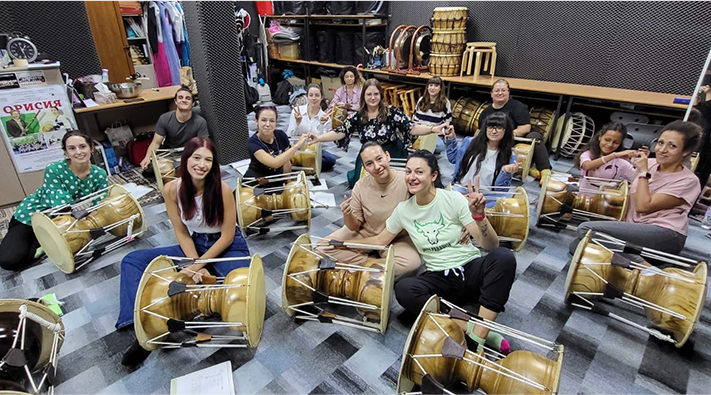 Commemorative Photo after the First Practice of the Samulnori Culture Class in September 2023
Commemorative Photo after the First Practice of the Samulnori Culture Class in September 2023
Do you have any acquaintances who are interested in Korean language and culture? How would you introduce KSI
Sofia or its Korean language classes or Samulnori Culture Class to your Bulgarian acquaintances?
Gabriela : My friends are also very interested in Korea. So, I try to participate in various events related to Korean culture, including Korean food, with my friends. I also promote my Korean Studies major and KSI Sofia on social media.
Ivelina : I already promote Samulnori and KSI Sofia’s Korean language classes to the people around me every day. My daughter has also been learning Korean for seven years. Although taking classes, practicing, and performing in the Samulnori Culture Class can be challenging, I want to let my acquaintances know that they can enjoy every moment. I have made many friends here as well. I am looking forward to the next semester starting in September!
Martina : These days, many people seem to be interested in the Korean language or Korean culture. In Bulgaria, there are people from teenagers to those in their 40s and 50s who are interested in Korea. KSI is a friendly place where people of various ages and occupations who want to know more about Korea gather. Here, you can meet new friends and learn various skills or improve your abilities through numerous Korean culture workshops. Attending KSI has helped me transform from being shy and introverted to being more open and kind. This change has been a significant help in my life, and I want to tell people that KSI is a place where they can have many valuable experiences.
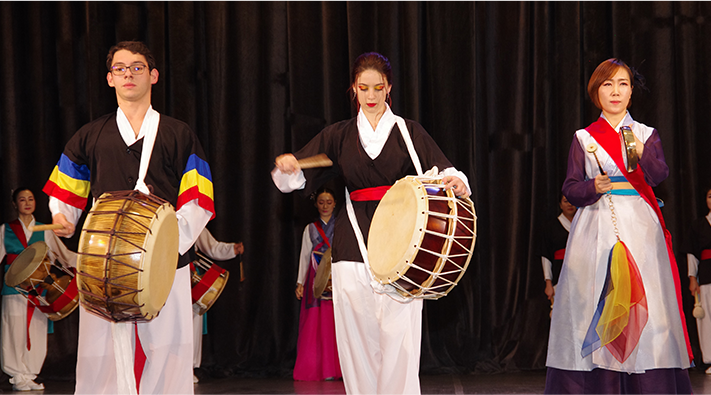 Martina Mishonova(center) performing a drum dance at the Sejong Cultural Academy Achievement Presentation in November 2022 at KSI Sofia, during
Martina Mishonova(center) performing a drum dance at the Sejong Cultural Academy Achievement Presentation in November 2022 at KSI Sofia, during
Do you plan to continue studying at KSI Sofia? If so, what goals or career plans do you have through Korean language or Samulnori classes?
Gabriela: I plan to continue taking Samulnori classes at KSI Sofia. Although I don’t have specific plans for the future yet, I want to further improve my Korean language and Samulnori skills through KSI Sofia. I also want to continue performing Samulnori for a long time with my current teachers and friends.
Ivelina: I also plan to continue my studies at KSI Sofia. I want to keep in touch with the people I met at KSI as much as possible.
Martina: I want to continue participating in the Samulnori Culture Class as long as I am in Sofia and KSI Sofia offers the classes. Meeting friends weekly, sharing laughter, and playing music together makes me truly happy. The purpose of our class is not just to improve our skills but to enjoy a fun time together and escape from everyday life. For me, Samulnori has already become a passion and a dream beyond just a hobby. If given the chance, I want to formally study Korean traditional music in Korea. To achieve this dream, I am concerned about living abroad, funding my studies, and extending my university life, but I have started researching bachelor programs at Korean universities to apply for scholarship programs to go to Korea in the fall. I want to live without regrets, so I am willing to take on the challenge. As people say, going through difficult experiences makes you stronger. I hope studying abroad in Korea will be an opportunity to make me stronger. I am also curious about what kind of future lies ahead for me.